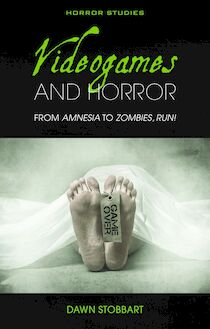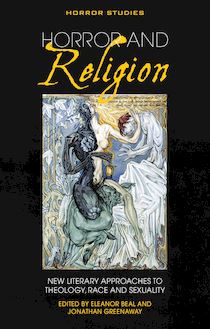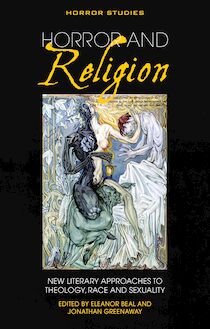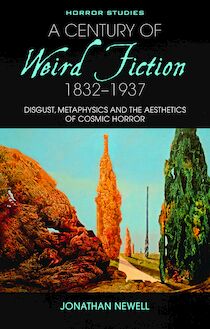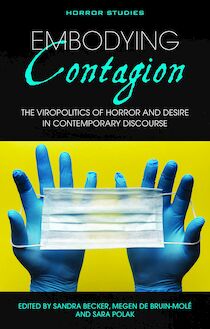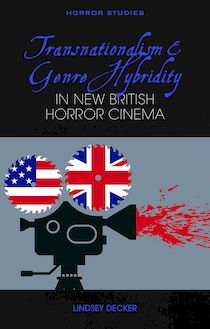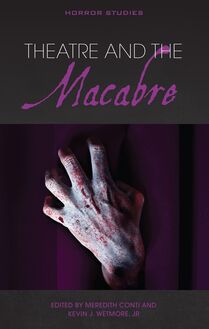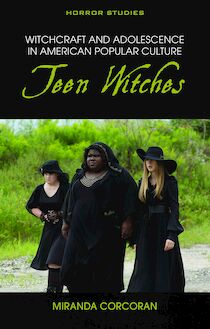-
 Univers
Univers
-
 Ebooks
Ebooks
-
 Livres audio
Livres audio
-
 Presse
Presse
-
 Podcasts
Podcasts
-
 BD
BD
-
 Documents
Documents
-
- Cours
- Révisions
- Ressources pédagogiques
- Sciences de l’éducation
- Manuels scolaires
- Langues
- Travaux de classe
- Annales de BEP
- Etudes supérieures
- Maternelle et primaire
- Fiches de lecture
- Orientation scolaire
- Méthodologie
- Corrigés de devoir
- Annales d’examens et concours
- Annales du bac
- Annales du brevet
- Rapports de stage
La lecture à portée de main
Vous pourrez modifier la taille du texte de cet ouvrage
Découvre YouScribe en t'inscrivant gratuitement
Je m'inscrisDécouvre YouScribe en t'inscrivant gratuitement
Je m'inscrisEn savoir plus
Vous pourrez modifier la taille du texte de cet ouvrage
En savoir plus

Description
Horror and Religion is an edited collection of essays offering structured discussions of spiritual and theological conflicts in Horror fiction from the late-sixteenth to the twenty-first century. Contributors explore the various ways that horror and religion have interacted over themes of race and sexuality; the texts under discussion chart the way in which the religious imagination has been deployed over the course of Horror fiction’s development, from a Gothic mode based in theological polemics to a more distinct genre in the twenty-first century that explores the afterlife of religion. Horror and Religion focuses on the Horror genre and its characteristics of the body, sexuality, trauma and race, and the essays explore how Horror fiction has shifted emphasis from anti-Catholicism and anti-Semitism to incorporate less understood historical and theological issues, such as the ‘Death of God’ and the spiritual destabilisation of the secular. By confronting spiritual conflicts in Horror fiction, this volume offers new perspectives on what we traditionally perceive as horrifying.
Acknowledgements
Notes on Contributors
Introduction
1. ‘Headlong into an Immense Abyss’: Horror and Calvinism in Scotland and the United States - Neil Syme
2. The Blood is the Life: An Exploration of the Vampire’s Jewish Shadow - Mary Going
3. Decadent Horror Fiction and Fin-de-Siècle Neo-Thomism - Zoë Lehmann Imfeld
4. ‘Let the Queer One in’: The Performance of the Holy, Innocent and Monstrous Body in Vampire Fiction - Rachel Mann
5. More or Less Human, or Less is More Humane?: Monsters, Cyborgs and Technological (Ex)tensions of Edenic Bodies - Scott Midson
6. Horror and the Death of God - Simon Marsden
7. Aboriginal Ghosts, Sacred Cannibals and the Pagan Christ: Consuming the Past as Salvation in Wilson Harris’s Jonestown - Eleanor Beal
8. Reconfiguring Gothic Anti-Catholicism: Faith and Folk-Horror in the Work of Andrew Michael Hurley - Jonathan Greenaway
9. ‘Deliver Us from Evil’: David Mitchell, Repetition and Redemption - Andrew Tate
Bibliography
Index
Sujets
Informations
| Publié par | University of Wales Press |
| Date de parution | 15 juillet 2019 |
| Nombre de lectures | 0 |
| EAN13 | 9781786834423 |
| Langue | English |
Informations légales : prix de location à la page 0,2850€. Cette information est donnée uniquement à titre indicatif conformément à la législation en vigueur.
Extrait
HORROR AND Religion
HORROR STUDIES
Series Editor
Xavier Aldana Reyes, Manchester Metropolitan University
Editorial Board
Stacey Abbott, Roehampton University Harry M. Benshoff, University of North Texas Linnie Blake, Manchester Metropolitan University Fred Botting, Kingston University Steven Bruhm, Western University Steffen Hantke, Sogang University Joan Hawkins, Indiana University Agnieszka Soltysik Monnet, University of Lausanne Bernice M. Murphy, Trinity College Dublin Johnny Walker, Northumbria University
Preface
Horror Studies is the first book series exclusively dedicated to the study of the genre in its various manifestations – from fiction to cinema and television, magazines to comics, and extending to other forms of narrative texts such as video games and music. Horror Studies aims to raise the profile of Horror and to further its academic institutionalisation by providing a publishing home for cutting-edge research. As an exciting new venture within the established Cultural Studies and Literary Criticism programme, Horror Studies will expand the field in innovative and student-friendly ways.
HORROR AND Religion
NEW LITERARY APPROACHES TO THEOLOGY, RACE AND SEXUALITY
EDITED BY ELEANOR BEAL AND JONATHAN GREENAWAY
© The Contributors, 2019
All rights reserved. No part of this book may be reproduced in any material form (including photocopying or storing it in any medium by electronic means and whether or not transiently or incidentally to some other use of this publication) without the written permission of the copyright owner except in accordance with the provisions of the Copyright, Designs and Patents Act. Applications for the copyright owner’s written permission to reproduce any part of this publication should be addressed to the University of Wales Press, University Registry, King Edward VII Avenue, Cardiff, CF10 3NS.
www.uwp.co.uk
British Library Cataloguing-in-Publication Data
A catalogue record for this book is available from the British Library.
ISBN 978-1-78683-440-9 eISBN 978-1-78683-442-3
The rights of The Contributors to be identified as authors of this work have been asserted in accordance with sections 77 and 79 of the Copyright, Designs and Patents Act 1988.
The publisher has no responsibility for the persistence or accuracy of URLs for any external or third-party internet websites referred to in this book, and does not guarantee that any content on such websites is, or will remain, accurate or appropriate.
Cover image: Fay Pomerance, The Sixth Palace of Hell (1945), watercolour. Charles Walker Collection/Alamy Stock Photo
Contents
Acknowledgements
Notes on Contributors
Introduction
1. ‘Headlong into an Immense Abyss’
Horror and Calvinism in Scotland and the United States
Neil Syme
2. The Blood Is the Life
An Exploration of the Vampire’s Jewish Shadow
Mary Going
3. Decadent Horror Fiction and Fin-de-Siècle Neo-Thomism
Zoë Lehmann Imfeld
4. ‘Let the Queer One in’
The Performance of the Holy, Innocent and Monstrous Body in Vampire Fiction
Rachel Mann
5. More or Less Human, or Less is More Humane?
Monsters, Cyborgs and Technological (Ex)tensions of Edenic Bodies
Scott Midson
6. Horror and the Death of God
Simon Marsden
7. Aboriginal Ghosts, Sacred Cannibals and the Pagan Christ
Consuming the Past as Salvation in Wilson Harris’s Jonestown
Eleanor Beal
8. Reconfiguring Gothic Anti-Catholicism
Faith and Folk-Horror in the Work of Andrew Michael Hurley
Jonathan Greenaway
9. ‘Deliver Us from Evil’
David Mitchell, Repetition and Redemption
Andrew Tate
Bibliography
Notes
Acknowledgements
W E WOULD LIKE to express our gratitude to Sarah Lewis and the publishing team at University of Wales Press for their support of this project. Our sincere thanks also goes to Horror Studies series editor, Xavier Aldana Reyes, for his friendship and his encouragement and advice. Finally, we especially want to thank all the contributors whose hard work, diligence and enthusiasm made this book possible. Each one was a delight to work with.
Notes on Contributors
Eleanor Beal is Associate Lecturer in Film and Literature at Manchester Metropolitan University. Her research focuses on the intersections between theology, religion and sexuality in contemporary literature. She is author of the forthcoming Post-secular Gothic: Disenchantment and Reenchantment in Contemporary Gothic Fictions (Palgrave Macmillan).
Mary Going is a PhD candidate at the University of Sheffield, exploring depictions of Jewish characters, myths and legends – such as Shylock, Cain, vampires and the Wandering Jew – in late eighteenth- and early nineteenth-century literature. She is co-organiser of Sheffield Gothic, and lead organiser of the ‘Reimagining the Gothic’ and ‘Gothic Bible’ projects at the University of Sheffield. She is also the current web officer for the International Gothic Association.
Jonathan Greenaway is Associate Lecturer in Film and Literature at Manchester Metropolitan University. His research focuses on the Gothic, Marxism and theology. He is co-founder and editor of the Dark Arts Journal and the author of the forthcoming book Theology, Horror and Fiction: A Reading of the Gothic Nineteenth Century (Bloomsbury Academic).
Zoë Lehmann Imfeld was recently Mileva Maric Fellow at the Center for Space and Habitability (exact sciences), University of Bern. She is a Senior Lecturer in Modern English Literature at the University of Zurich and Lecturer at the University of Bern. She is currently working on a postdoctoral project on the hermeneutics of space research in science-fiction narratives. She is author of The Victorian Ghost Story and Theology: From Le Fanu to James (2016) and co-editor with Peter Hampson and Alison Milbank of Theology and Literature after Post-Modernity (2016).
Rachel Mann is an Anglican priest and Visiting Teaching Fellow in English Literature and Creative Writing at Manchester Metropolitan University. She is the author of five books, and is former Resident Poet at Manchester Cathedral.
Simon Marsden is a Senior Lecturer in English Literature at the University of Liverpool. His research focuses on intersections of religion and literature from the Romantic era to the present. He is the author of Emily Brontë and the Religious Imagination (2014) and The Theological Turn in Contemporary Gothic Fiction: Holy Ghosts (2018), and has published widely in edited collections and journals, including Literature and Theology and Gothic Studies.
Scott Midson is a Postdoctoral Research Associate at the Lincoln Theological Institute, and is based in Religions and Theology at the University of Manchester. His research focuses on posthumanism and theology, which includes questions of what it is to be human and (re)created in God’s image. He is author of Cyborg Theology: Humans, Technology and God (2018). His current project explores love and machines.
Neil Syme completed his PhD in post-1970s Scottish Literature and the Uncanny at Stirling University, where he has worked as Teaching Fellow and convenor of the MLitt module Scottish Gothic. His research interests include uncanny modalities in literature, the relation between banal nationalism and the construction of literary tradition, and the Scottish Gothic.
Andrew Tate is Reader in Literature, Religion and Aesthetics at Lancaster University. His books include Contemporary Fiction and Christianity (2000), The New Atheist Novel (2010, co-authored with Arthur Bradley) and Apocalyptic Fiction (2017). He also co-edited Literature and the Bible: A Reader (2014) with Jo Carruthers and Mark Knight.
Introduction
Eleanor Beal and Jonathan Greenaway
H ORROR HAS BEEN seen as the outcast genre of British and American literature. As Steffen Hantke observes, there is an academic anxiety that Horror might ‘ultimately be too frivolous, too garish, and sensationalistic to warrant serious critical attention’. 1 Similarly, religion and theology has not preoccupied Horror critics excessively, especially if one takes into account the considerable amount of space that has been dedicated to the other big approach to understanding the internal world of the human – psychoanalysis. Psychoanalytical approaches to Horror have been important parts of establishing the legitimacy of Horror within academic culture since the 1970s, and more steadily since the 1980s, and this has come at the cost of other approaches, particularly theological approaches to Horror. Of course, to a certain extent this is to be expected, since psychoanalysis is commonly seen as more flexible and adaptable than religious faith and dogma, and is a marker of our increasingly individualised, secular state of being. Yet, like the uncanny and the return of the repressed, religion and theology also have their patterns and voices in Horror texts: the voice of St Augustine on perversion, Thomas Aquinas on evil, and Kierkegaard on the passion for the impossible, being just a few examples. These voices, too, must be recognised in order to understand the spiritual and existential fears and anxieties explicit in Horror literature. This lack of interest seems to be reversing somewhat with recent publications in Gothic scholarship, including Diane Long Hoeveler’s Gothic Riffs: Secularising the Uncanny in the European Imaginary, 1780–1820 (2010) and Victoria Nelson’s Gothicka (2012). Key to these writings is the argument that the aesthetics of Gothic and religion pervade popular cultural forms in both the late eighteenth century (Hoeveler) and the late twentieth to twenty-first centuries (Nelson). Unlike these texts, which take a much-needed aesthetic approach to the interface between religion, Gothic and media, Horror and Religion proposes a theological approach that both reviews established polemical readings of the Horror genre, such as Calvinism, Catholicism and Christian anti-Semitic discourses, and more contemporary debates within Horror lit
-
 Univers
Univers
-
 Ebooks
Ebooks
-
 Livres audio
Livres audio
-
 Presse
Presse
-
 Podcasts
Podcasts
-
 BD
BD
-
 Documents
Documents
-
Jeunesse
-
Littérature
-
Ressources professionnelles
-
Santé et bien-être
-
Savoirs
-
Education
-
Loisirs et hobbies
-
Art, musique et cinéma
-
Actualité et débat de société
-
Jeunesse
-
Littérature
-
Ressources professionnelles
-
Santé et bien-être
-
Savoirs
-
Education
-
Loisirs et hobbies
-
Art, musique et cinéma
-
Actualité et débat de société
-
Actualités
-
Lifestyle
-
Presse jeunesse
-
Presse professionnelle
-
Pratique
-
Presse sportive
-
Presse internationale
-
Culture & Médias
-
Action et Aventures
-
Science-fiction et Fantasy
-
Société
-
Jeunesse
-
Littérature
-
Ressources professionnelles
-
Santé et bien-être
-
Savoirs
-
Education
-
Loisirs et hobbies
-
Art, musique et cinéma
-
Actualité et débat de société
- Cours
- Révisions
- Ressources pédagogiques
- Sciences de l’éducation
- Manuels scolaires
- Langues
- Travaux de classe
- Annales de BEP
- Etudes supérieures
- Maternelle et primaire
- Fiches de lecture
- Orientation scolaire
- Méthodologie
- Corrigés de devoir
- Annales d’examens et concours
- Annales du bac
- Annales du brevet
- Rapports de stage
